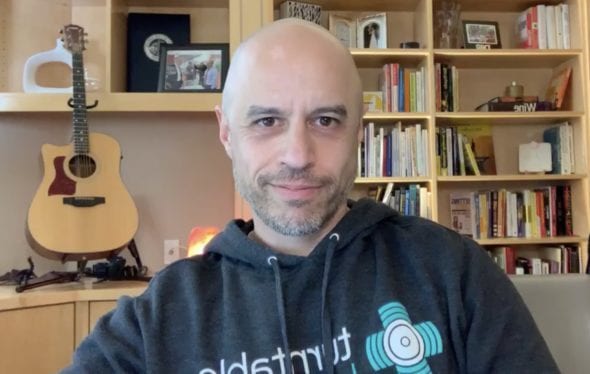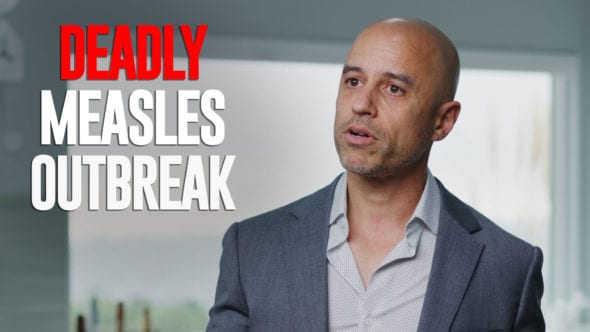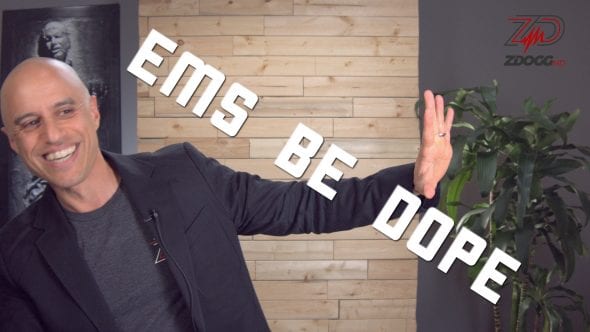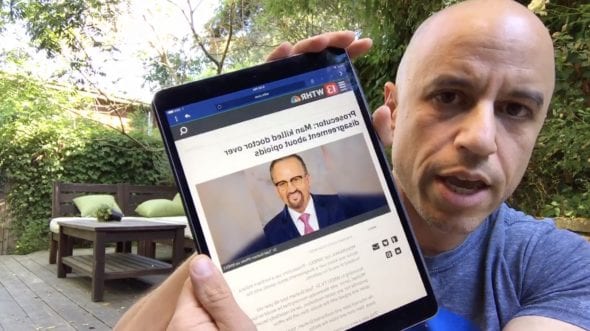The FDA advisory committee voted this week to reject approval of COVID Pfizer vaccine boosters for healthy people 16 and up. Here’s what’s up with that, and how we can better understand the booster question for the healthy and those at higher risk.
– [Zubin] Hey, so the FDA Advisory Committee this week weighing in on booster shots regarding Pfizer and basically said, “Hey, 16 and up, we can’t recommend this.” And we’re gonna talk about that. 65 and up, frontline healthcare workers, people at risk for severe disease, people at risk for catching it at work: we may recommend boosters. Alright. So let’s unpack all this stuff, because it can get very confusing. First of all, why are we just talking about Pfizer? Well, ’cause Pfizer’s the one that’s first filing all this stuff. We have this data out of Israel, because Israel only used Pfizer.
And we gotta remember that Pfizer was the only vaccine that had the two doses that was spaced so closely together, three weeks apart. So, there is actually some speculation that they did that incorrectly; it was too close together. So, spacing it three weeks apart may not have been enough time to get the innate booster effect of getting the second dose.
And so, in a way, could it be that the Pfizer vaccine being spaced like that is the equivalent of getting a single dose? As compared to Moderna that was a higher dose of vaccine and spaced out another week, and the data seems to suggest so far that Moderna might be a little bit more effective at preventing both severe disease and infection further out. But again, we don’t know how much further out beyond what we’ve measured so far. So, they’re really focusing on Pfizer, and a lot of it was based on the Israeli experience. The Israelis started using Pfizer like earliest and vaccinated a bunch of people really fast.
And then what they found is, well, they were getting breakthrough infections and some of them were having severe disease. So, who were these people? It was mostly elders that were getting breakthrough with severe disease. And there is a lot confounders here in the datasets coming out of Israel, because these are observational trials.
They’re not randomized control trials, so a lot of times there can be bias. If you’re looking at, okay, we gave boosters in Israel and the people with boosters had a twentyfold less chance of getting infected and a tenfold less chance of being hospitalized, but what else was different about the type of person who ended up getting a booster? Were they more careful about their health? Was there other stuff going on? So, we’ve talked a little bit about that elsewhere, but the bottom line is the data wasn’t as compelling as say a randomized control trial would be.
But this was enough along with Pfizer saying, well, we’ve been measuring antibodies and it turns out the antibodies drop over time. So a booster, when we give it, makes the antibodies go crazy; but, of course, we forgot the fact that there are other aspects to immunity other than measurable serum antibodies like memory B cells, T cells, et cetera, that give us our long-lasting durable immunity. So, when you actually look at the data so far, the protection against severe disease at least in the United States is still like near 90% for Pfizer and a little higher for Moderna. So, why are we talking about boosters again? So, this is where the FDA kinda got into it.
They said, “Well, alright. Let’s look at people 16 and up. Do they need a booster?” First of all, and what the argument here is, well, first of all, it’s too soon. We still have such good protection against severe disease. Why are we talking about boosters? Isn’t the idea of the vaccine to prevent people from overwhelming hospitals with sick patients from dying from having severe disease? Well, yeah. And for that it appears they are working. So, it’s still like a tenfold reduction in hospitalization if you’ve been vaccinated, despite Delta. These are the latest CDC numbers, and roughly a fivefold reduction in getting infected.
Now, here’s the bottom line: I don’t care really if you get infected if you’re not gonna get super sick, because the idea is we’re not getting rid of this virus. It’s not going away! You’re never going to get to COVID zero! It’s a pipe dream! This is a coronavirus that is going to be part of the human circulating coronaviruses. So, the goal is not to eradicate it. It’s not to eliminate every infection. It’s to make those infections more like a common cold or mild flu, which is what both natural infection with previous coronavirus and vaccination can do. So, why are we talking about boosters? Because, again, both Pfizer and the Israelis have been saying, “Well, but the protection is waning over time, so we could put a dent in the pandemic by preventing more infection by boosting and maybe preventing some more severe disease by boosting, including in people that aren’t at high risk or aren’t elderly.” Well, did it pan out?
So, one of the objections is, “No, it’s too soon.” If you’re gonna talk about boosters even for that purpose, you better show that severe disease is waning, and you’re not seeing that, really, in the United States data. The other issue is, what about the datasets itself? Are they even reliable to count on? Well, if you’re gonna trust the pharmaceutical company itself, then you better peer-review the data that they’re giving. And it turns out a lot of Pfizer’s data on boosters is not peer reviewed. So, the FDA said, “Well, look, we haven’t even seen the raw data here. It hasn’t been peer reviewed.” You’re using surrogate endpoints to determine efficacy.
And what I mean by that is you’re using measurable serum antibody levels. How do those actually reflect in the real world, which is what we care about, right? Infection rate and severe disease, really severe disease. And they go, “Well, but look at the Israelis. They found that severe…” Again, there’s biases in that data and, again, you have a population there that were only looking at Pfizer. There’s other issues that Vinay Prasad and I spoke about on our previous episode, which I will link to. So, there’s that component of like, does the data even, is it compelling for people that aren’t at high risk? And the answer is probably not. Right? That may change, but right now it’s not. Now, the third piece is safety. Well, okay. You look at old people. You give them a booster. They seem to do fine, right, but old people were at low risk for things like myocarditis anyways with the vaccine and much higher risk for COVID. This is a disease where applying the rules, that you would apply for childhood vaccinations to this disease, don’t always make sense.
So with kids’ vaccines, you’re trying to prevent disease and illness in kids. Okay. That’s great. But in this case, the gradient of risk goes up exponentially log fold as you get older. So that means that when you’re vaccinating younger people you’re trying to prevent a disease that is less and less and less likely to cause you harm. So that means that the relative risk of the vaccine better be low. Well, it turns out the vaccine does have a risk, and that’s myocarditis. Now, again, it’s usually reversible. The risk of natural COVID infection causing myocarditis may be quite a bit higher, but we don’t know who’s gonna get it and what.
But let’s say you’re gonna start vaccinating a bunch of 16-year-olds with a booster. Well, you better have good data that that is not gonna increase the risk of myocarditis above and beyond what the second dose does, because we already know the second dose increases risk of myocarditis, especially in young boys. So kids, boys like 16 to 29. I guess 29 is still considered a boy to me when you’re 48. So, you better hope that you have good data that that doesn’t happen. Well, we don’t. So, the FDA Advisory Committee said, “We just don’t even have good data on safety.” How can you recommend a booster when you don’t know the benefits and you don’t know the risks? Well, how would you get that data? Do a randomized control trial with people who’ve already had two doses. Randomized to placebo, which means they get a dose of a saline shot, and then randomize the other group to getting the booster.
And see moving forward, with the matched groups that are randomized, what the outcomes are with downside of risk and benefit of infection dropping and severe disease dropping. That’s how you do that. That’s what we ought to be doing. It’s crazy to me that we have Israeli scientists coming and presenting to an American FDA committee when we ought to be doing this research ourselves!
Where is our tax money going for this? Right? It’s crazy! So anyways, the FDA said, “Look, we just don’t know the risk of this.” And Paul Offit said, “I don’t know about young 16-year-olds with this. For a booster, it just doesn’t necessarily make sense.” So, those are the bigger arguments. And then you have the question of, well, then what ought we be doing with this effort? Getting people vaccinated with the original series in the first place. And as I’ve said, I think mandates are likely, to some extent, to help because people will get vaccinated. But to a bigger extent, they’re gonna backfire; because, first of all, there’s a relatively small proportion of the population that you’re gonna affect with your mandates that are within the purview of the mandates, right? I’ll tell you, judging by the emails I’m getting, you’re turning off people left and right who were ready to get vaccinated. All they needed is someone to sit and talk with them, answer their legitimate questions about whether it’s natural immunity. Whether it’s about waiting for Novavax, which I don’t think you should do.
Whether it’s about safety, which I talk about. That’s what they need. Let’s get people vaccinated. We know that helps. What will a booster do to the longterm shape of the pandemic now? Probably not much! Focus your effort and your attention on what actually is going to work. The goal is to turn this thing endemic like a cold. So, how are you gonna do that? Get as many people immune as you can as quickly as you can. Well, natural infection is doing that with Delta, and vaccination will do that. Now, what about people who are really high risk? Oh. By the way, by the way, let’s say you are talking about a booster. What about the timing on that?
Like, if you get a boost. Okay. Because here’s another thing about the Israeli data. Well, we boosted a bunch of people and look. They have these high antibody levels and they’re twentyfold less likely to get infected and tenfold less likely, elevenfold less likely to be hospitalized according to some Israeli data. Yeah. Over what period of time? Right after the vaccine maybe that’s true when you’re swimming in antibodies, but what happens weeks to months later? So, let’s say you start boosting everybody now, and then you have a late winter surge, or no surge, or something that happens in the spring. Well, it may be too late then. So, even the timing of when to give a booster, because we don’t understand the dynamics of it, ’cause haven’t done the trials! That matters, right? Now, let’s circle back to 65 and older, and then we’ll talk about people at high risk, et cetera. Okay. So 65 and older, here’s my intuition on this looking at the data.
I do think that that’s a population that gets immune aging, meaning they are the ones who are most likely to have waning immunity against even severe disease. And they’re the highest risk for severe disease. I don’t think it’s wrong to say a booster’s reasonable for them. Obviously, you don’t mandate it, but you say, “Okay. You guys want that? That’s cool.” My parents. Now, see, my parents got Moderna. I got Moderna. We didn’t choose it, it was just what was available. Now, I don’t know that you need to boost that just yet. Right? Because we don’t have the data. Moderna is working on the data. Of course, it’s in their interest to say, yeah, we need a booster. Duh! They’re pharma. As my friend Vinay Prasad said on the show, “A tiger is a tiger: they’re gonna do what they do.” Even if they think it’s in our best interest, it may not be. So, you always have to question that data. But that being said, I think 65 and older, it makes sense to say what they said, which is, “We can probably recommend this.” Right? Now, what about healthcare workers and frontline workers that are at high risk for infection? This is where it gets kind of squishy, because the person who works in the mail room at the hospital.
I don’t even know if they have a mail room anymore. The email room. The IT guy as Vinay said on one of his episodes. Are they at the same risk as like a frontline respiratory therapist? And would you say, then, they should go ahead and get a booster now when there’s no good data? And what if they’re young? They’re like 28. They’re at high risk for myocarditis and we don’t have safety data. Now, here’s the worst part of it. You know full well when the CDC Advisory Committee and CDC determines, okay, who are these groups and what are we gonna recommend? If they recommend healthcare workers get a booster, pretty soon hospitals and/or government are gonna mandate boosters. Okay. If that happens, you’re gonna see me scream and yell on this show. Literally scream and yell. Okay. You’ve already mandated it for healthcare workers, which has already pushed a lot of healthcare workers to start thinking about quitting when we have a shortage of people. These people who put their lives on the line, right? They’re as much victims of misinformation and not having enough level of wherewithal to look at primary data and all of that, a lot of healthcare workers.
So, why are we treating them like anything other than the victims of misinformation they are by forcing them, right? It’s like holding a child down and forcing castor oil back in the old days down their throat, because it’s good for you. If you mandate boosters in that population, and it turns out that they have some effect like worsening myocarditis or something, you are going to destroy the credibility of your institutions for decades to come if you haven’t done it already. Right? So that’s what I think about that. I think you better have better data and you better be very, very soft on recommendations for frontline workers. Now, people at other high risk: what does that even mean? CDC has got to tease out what they mean by that. Is diabetes high risk? Is prehypertension high risk? What does that mean? And again, are you gonna mandate boosters for people? Because to me that sounds like crazy talk in the absence of a randomized control trial that shows that this is essential to developing immunity against severe disease. And I’m not holding my breath to see that trial, even though that’s what we ought to be doing. Now, speaking of losing trust in our institutions.
Dr. Monica Gandhi and I, Dr. Vinay Prasad and I have both talked about the pros and cons of boosters, masking young children. Things like that in terms of absence of data. Okay. I put out these clips on everyone’s favorite platform: TikTok. So, my kids shamed me into joining TikTok. They said, “Dad, everybody’s on TikTok. Only old people are on Facebook and YouTube and Instagram.” Old I guess is defined as anyone over five. So TikTok, I finally bit the bullet. We put some clips on there. TikTok banned my Monica Gandhi clip on boosters for healthy people, which basically said what the FDA said. Before the FDA said it, it’s what we said.
And the second clip was Vinay Prasad and I talking about the data on masking, the paradox of how we treat masking young kids. We’ll let them eat lunch next to each other and share food, but then we’ll make them run outside with a mask on. We’ll make them do that during PE. And they’re like huffing and puffing in an infinite volume of distribution, when there’s no data that that helps them. So, those were the two videos I put out. Both pulled for violation of community guidelines on misinformation by TikTok. Okay? So, now the Chinese Communist Party that basically owns TikTok. I don’t know if that’s true; I heard it somewhere, somewhere probably unreputable. Is making decisions on misinformation when a UCSF doctor, myself, two UCSF doctors are talking about…? Is this how we do science now and science communication? Is this how people are gonna trust? This is why people messaged me.
They’re like, well, I don’t trust anybody but you. I’m like, first of all, that’s terrifying, ’cause I’m just a bald clown on the internet. Second of all, it goes right to the heart of what a terrible job we have done on this thing. Alright. That’s the FDA and boosters. The call to action now is if you haven’t been vaccinated and you haven’t been infected with COVID, get vaccinated, please. If you’ve been vaccinated with two doses and you’re fully vaccinated, and you’re high risk and elderly, consider a booster. If you’re not, forget about it. Do your thing. Alright? If you’re naturally infected, consider at least one dose of a vaccine just because it will get us to that endemic status quicker, and it may be better against longterm protection against infection and severe disease. And these vaccines are quite safe but, again, it’s a distribution of age and risk and you’re not wrong to ask questions. You’re not an anti-vaxxer to ask questions about this stuff.
Alright, guys? I love you so much. Please share this video. If you’re really into the whole thing, you can join us on our supporter group. Just go to ZDoggMD.com/supporters. And we are out. Peace.
Related Videos
Category
- The ZDoggMD Show (799)
- Featured Videos (188)
- Doc Vader (142)
- Against Medical Advice (128)
- Medical Humor (95)
- Public Service Announcements (87)
- Music Parodies (74)
- Nurses (59)
- Meditation (38)
- ZVlogg (36)
- The VPZD Show (31)
- ZTalks (28)
- ZBlogg (24)






